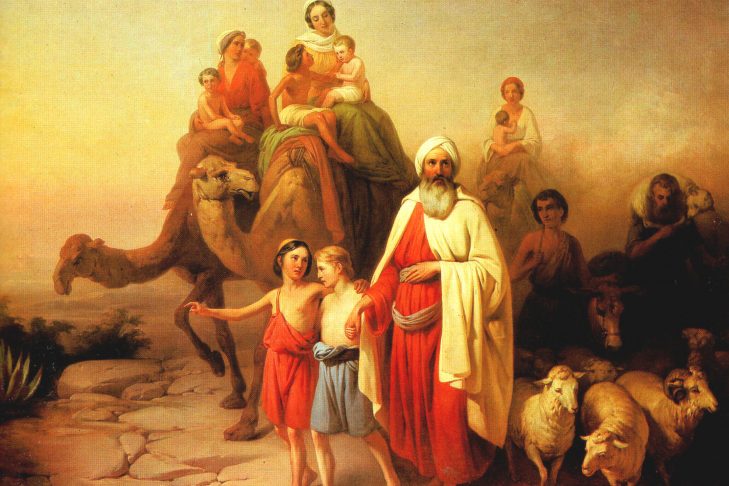This week’s Torah portion includes two great dramas: the flood story (chapters 6-9) and the tale of the Tower of Babel (chapter 11). In the closing lines of the reading, we are briefly introduced to the great patriarch Abraham (still known as Abram at this point). This introduction, however, is terse and understated, especially considering the drama of the two earlier narratives. We learn nothing about Abram’s character or achievements from these brief lines (Genesis 11:27-32).
Chapter 12, which also serves as the opening of the next Torah portion (Lekh Lekha) then begins with one of the most well-known verses in the entire Hebrew Bible:
YHWH said to Abram,
“Go forth from your native land
and from your father’s house
to the land that I will show you….”
—Genesis 12:1
God continues by promising Abram that God will make him and his offspring a “great nation” and that he will be a “blessing.” And thus begins the unfolding story of the life of this legendary sojourner; his family; the Israelite people; and the other nations that issue from this man.
For centuries, biblical commentators have asked why God chose Abram to be the father of nations. What distinguished this individual from others of his generation (or any generation, for that matter)? What had he done in the decades before the reader first meets him at the end of Genesis 11?
One response I find particularly interesting comes from the midrashic collection Genesis Rabbah (likely composed between 300 and 500 CE, with some later additions). Commenting on Genesis 12:1, the brief text reads as follows:
To what can this [God’s call to Abram] be compared?
To a man who was traveling from place to place
when he saw a palace on fire (birah doleket).
He wondered, “Is it possible that the palace has no master?”
The master of the palace looked out and said, “I am the master of the palace.”
Similarly, Abraham Our Father said, “Is it possible that the world lacks a master?”
God looked out and said to him, “I am the Master, Sovereign of the Universe.”
—Genesis Rabbah 39:1
Abram is identified in this text (and others like it) as a seeker, captivated by the grandeur and mystery of the world, including the realities of pain and suffering. There were times when it felt to him like the world was ablaze and in danger of being consumed. In such moments, the patriarch wondered, “Is there a God? If so, where is the Divine?” In response to Abram’s noble search, God responded, “I am the Ruler, Sovereign of the Universe.” God spoke from within the fire, announcing His presence to this attentive and sensitive explorer.
Interestingly, centuries later, the theologian and activist Rabbi Abraham Joshua Heschel (d. 1972) read this midrash in a much more positive light. He pointed out that the Hebrew term “birah doleket” can be read not only as a “palace ablaze,” but as a palace “full of light (God in Search of Man, pp. 112-113, p. 367). Meaning, Abram was indeed a seeker captivated by the grandeur and mystery of life, but was enchanted by the beauty of the world. “Is it possible that this beautiful, light-filled world lacks a ruler?”
I think both readings are crucial in our beautiful and broken world. Life, as we know all too well from recent global events, involves too much pain and suffering—smoke and fire—some of it caused by human beings (with the free will to make good and bad decisions), and some of it woven into the very fabric of being. But it also includes breathtaking beauty. And as our midrash suggests, God is present in all of it.
Notice that in the rabbinic allegory the master of the burning palace announces his presence but does not put out the fire. I do not read this as a statement about God’s inattention to or inaction in the world but as a divine call—to Abram and to all who follow in his footsteps—to serve as partners (shutafim in rabbinic parlance) in the ongoing project of fashioning a more just, compassionate and sustainable world (a theological-ethical position Rabbi Heschel argued for and modeled so powerfully).
Our midrash teaches that God’s call to Abram in Genesis 12:1 comes in response to the patriarch’s search and call, stimulated by his awareness of both the brokenness and beauty that inhere in God’s creation. May we have the cognizance and courage to respond to this ongoing divine call in our place and time.
Rabbi Or Rose is the founding director of the Betty Ann Greenbaum Miller Center for Interreligious Learning & Leadership of Hebrew College.
This post has been contributed by a third party. The opinions, facts and any media content are presented solely by the author, and JewishBoston assumes no responsibility for them. Want to add your voice to the conversation? Publish your own post here. MORE


